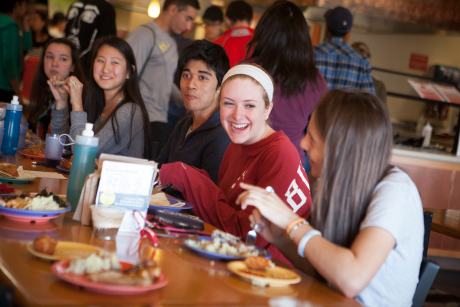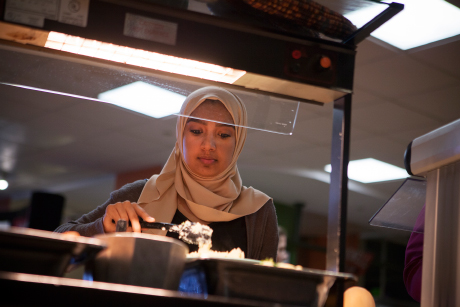Harvest Dinner serves up delicious sustainability
By Blaine Friedlander



Sustainable went beyond sustenance when more than 1,550 Cornell students feasted at the Robert Purcell Marketplace Eatery’s ninth annual Harvest Dinner Oct. 9 that featured a cornucopia of autumnal bounty grown near campus and from the surrounding region.
“We have an excellent agricultural college with a beautiful dairy program and orchards,” said Steve Miller, an executive chef and director of culinary operations at Cornell Dining who visits local producers frequently to supply the university’s dining operation. His campus facilities serve 24,000 meals daily and about 5 million meals annually. “We always look for opportunities to buy local … and at this Harvest Dinner here we get to show who we are and showcase what Cornell believes in.”
With tasty offerings at every station, the students dined on Cornell-grown butternut squash soup featuring Cornell Orchard apples blended with Cornell Dairy triple cream. The students found roasted leeks and seasonal vegetables served atop braised local kale. The root vegetable cassoulet with pumpkin was served over fine grits and topped with a house puff pastry.
From the savory to the sublime, the Robert Purcell dining hall staff dished out Ithaca Brewery root beer floats featuring Cornell Dairy vanilla ice cream. Beyond pepperoni and mushroom, at the pizza station, students dined on roasted pear and goat cheese pizza, which featured cheese – melted to perfection – from Lively Run Goat Dairy in Interlaken, New York.
Cornell Dining has dozens of suppliers, and Miller is proud of his local producers, noting that full produce trucks and short distances are sustainable ways to operate. He noted Guinta and Son Produce, Syracuse; Tassone Farms, Cicero; Jacobson Farms, Fulton; and Cornell’s Homer C. Thompson Vegetable Research Farm in Freeville provide produce for the dining operations.
Cornell is the first university in New York to receive “Free to Roam” pork products from Hatfield, a food company in northeastern Pennsylvania. The pigs are raised in open pens, treated humanely and are not stressed, said Jason McClellan, Hatfield’s business development manager.
Claire Siegrist ’15, who studies natural resources, serves as Cornell Dining’s lead sustainability coordinator. She conducts outreach and education, particularly in waste management and food sourcing. Siegrist’s goal is to keep trash from landfills by teaching students and staff to eat only what they need and to properly dispose of their waste. “To help our environment, education is really important,“ she said.
Media Contact
Get Cornell news delivered right to your inbox.
Subscribe